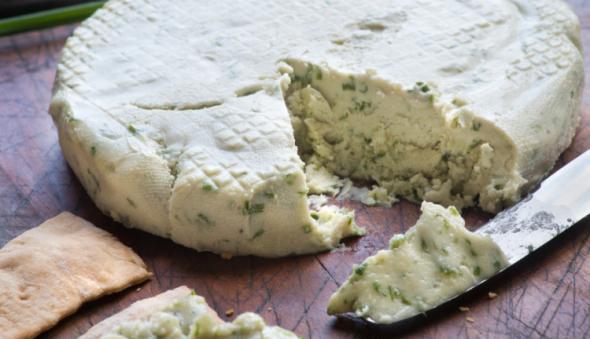If I were a perfectly moral person, I’d leave cheese off my plate. The cattle that produce the milk that goes into my favorite cheeses aren’t always treated humanely. Plus, cattle, including dairy cows, are responsible for emitting a large percentage of the methane that’s rapidly warming our planet.
But I know I speak for many people when I say that I could never be vegan because I’d miss cheese too much. (Actually, I went vegan for a hot second when I was a teenager, but I reverted to plain old lacto-ovo vegetarianism because of the cheese-shaped hole in my life.) Cheese makes it easy to be a vegetarian. Whether I’m crumbling Gorgonzola on a salad, slicing mozzarella for a pizza, grating Parmesan on top of a gratin, or just eating cheddar with Triscuits, cheese provides maximal flavor and satisfying heft in return for minimal effort on my part. And the vegan cheese substitutes that have been available for most of my life—plastic orange slices made out of soy or tapioca starch—are laughably inferior to the real thing.
So when I heard about a new type of vegan cheese that uses traditional cheesemaking techniques to give pulverized cashews a cheese-like texture and flavor, my interest was piqued. Miyoko’s Kitchen is one of a new generation of vegan cheese producers that use bacterial cultures to ferment nut milks. Founded by Miyoko Schinner, a longtime vegan cookbook author and restaurateur who wrote the book on vegan cheesemaking, Miyoko’s Kitchen has gotten rave reviews since it started selling its “cultured nut products” in the summer of 2014.
Miyoko’s Kitchen sent me samples of five of their cheeses, all of which have names that hint at their dairy-based inspiration. The Classic Double Cream Chive and Double Cream Sundried Tomato Garlic were excellent: smooth, creamy, tangy, and easily spreadable, they reminded me of Boursin, the highly processed herb-flecked French cream cheese. If I hadn’t known I was eating vegan cheese, I might have mistaken the double creams for dairy.
Miyoko’s Kitchen’s harder cheeses weren’t such skilled imitators, though. The High Sierra Rustic Alpine and the Aged English Sharp Farmhouse—whose cultures gave them the nutty taste of gruyere and the strong flavor of cheddar, respectively— were very good but not particularly cheese-like. Part of this had to do with their extreme tartness, an effect of chickpea miso, and part of it had to do with their light brown color. But it was mostly an issue of texture: Instead of being hard and slightly waxy, Miyoko’s Kitchen’s faux cheddar and gruyere were dense but pliable, like a Lärabar. When I spoke to Schinner, she told me that the texture was a function of aging and contended that if she’d been able to age the cheeses longer, they’d have a more authentically cheese-like texture. “At some point in the future we hope to be able to have a larger-capacity aging room where we can age cheeses for up to a year, but we don’t have that ability right now,” Schinner said.
Miyoko’s Kitchen’s cultured nut products, despite being the best vegan cheeses I’ve ever had, still fell victim to the vegan-cheese paradox. They made sense as a vegan proxy for cheese—there’s no other common foodstuff to which you could compare these rich, pungent, velvety, salty spreads. But by virtue of being called cheese, they were inherently disappointing. Once my expectations had been set to cheese, Miyoko’s Kitchen’s products were always going to miss the mark, in spite of being delicious on their own terms.
Did these less-than satisfying factors stop me from eating the cheeses? Absolutely not. I happily devoured all of my samples, even the chevre-like Country Style Herbes de Provence, which was coated in so much dried lavender it was hard to discern the flavor of the cheese below. If you can live with a little incongruity, you should give Miyoko’s Kitchen’s cultured nut products a try. (They’re currently available by mail order nationwide and are rapidly expanding their retail presence beyond the West Coast.) A vegan colleague has told me that two other vegan cheese companies that use similar techniques, Dr. Cow and Treeline Treenut Cheese, are also very good. I, for one, am glad Miyoko’s Kitchen and its peers exist, and the next time I’m entertaining, I’ll gladly round out my cheese board with one or two non-dairy variations. But until biohackers figure out how to make vegan cheese that’s chemically identical to real cheese, I’ll still reach for Cabot when I’m craving a good aged cheddar.
